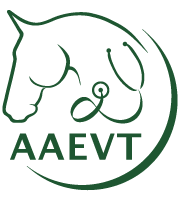October is Technician, Assistant & Support Staff Appreciation Month!
The AAEVT is celebrating all equine support staff, starting with technicians on October 17th! Follow us on Facebook for contests, drawings and fun games all month long! Don’t miss out!

We are humbled and amazed by your dedication to your equine patients and to making sure your practices run smoothly, that clients are taken care of, and that your veterinarians are supported. You do this day in and day out, enduring long hours, often times without lunch! You work through crazy schedules and emergencies, all for the love of what you do and the horse.
The horse needs all of us, and we are proud to recognize YOU as part of our AAEVT community. We salute you and thank you!
Here’s what your DVMs have to say about you:
“Apryl made me more organized, more efficient and the practice more profitable as captured costs/charges that I would forget to do. She also improved the quality of the care I was able to give my patients and allowed me to communicate/improved my ability to take care of clients (calls, reports etc).”
— Katherine C. MacGillivray, VMD, DACVIM
“It is truly impossible to provide excellent patient care without well trained and knowledgeable veterinary technicians and assistants. These amazing individuals are present with our patients, day in and day out, to ensure that our patients are healthy and receiving the highest level of care.”
— K Winkles DVM
“Well educated, efficient technicians are worth their weight in gold as they are able to anticipate needs and perform tasks well without assistance. This enables me to focus on a different aspect of the patient and provides higher quality care. They also allow me to worry less about my patients overnight as I know they are well equipped to provide excellent patient care and will recognize any urgent issues. I am extremely thankful for confident, educated technicians.”
— Dr. Erin Pearson
“LVTs improve the quality of care we provide our patients and clients with effective and compassionate clinical skills. They play a crucial role in client communications, in-patient monitoring and treatment, running the OR, as well as training students.”
— Dr. Rebecca McOnie
